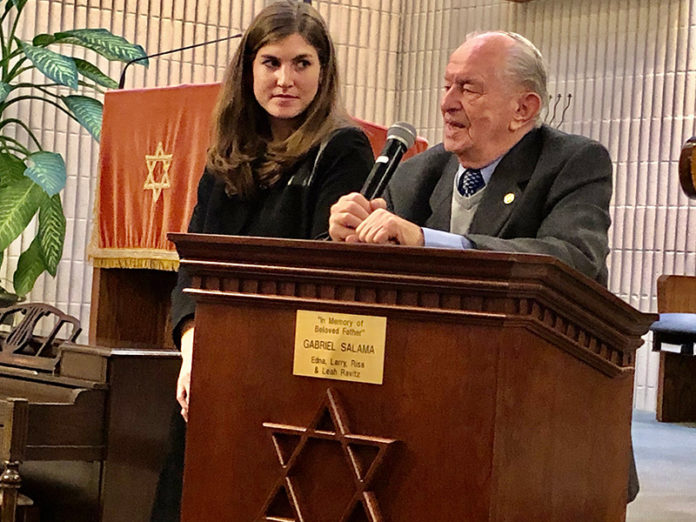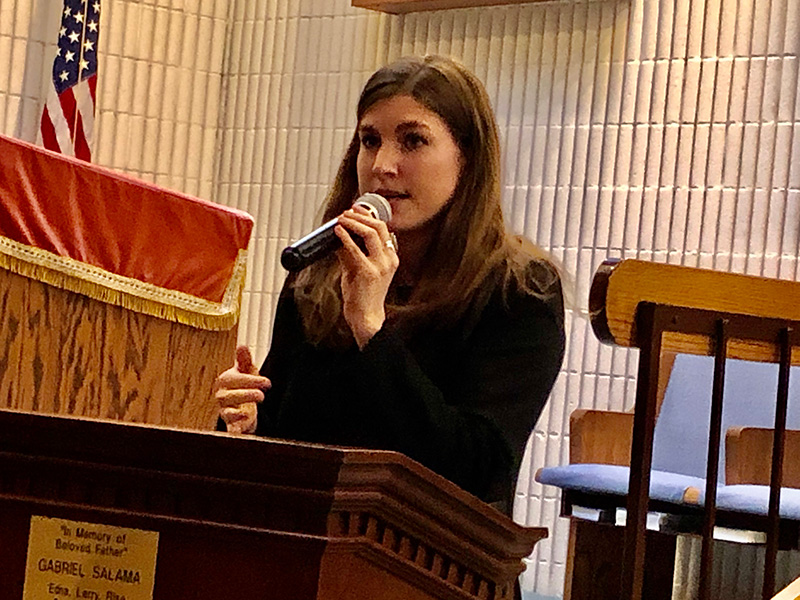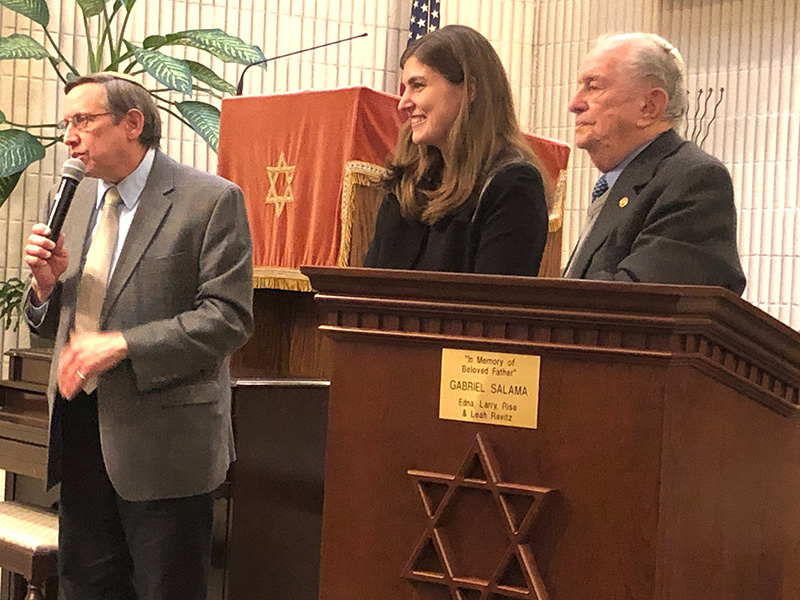
BRICK – Despite his experiences as a Jew in Krakow during World War II, Holocaust survivor Arthur Spielman, 90, says he’s a lucky man for not only living as long as he has, but also for surviving the Holocaust, along with his immediate family.
Spielman is one of 15 Holocaust survivors from Staten Island who are the subject of “Where Life Leads You,” an award-winning documentary by video journalist Shira Stoll.
Spielman and Stoll were featured speakers at a Holocaust survivor event held at Brick’s Temple Or recently.
Temple Beth Or Rabbi Robert Rubin said the event was held near the November 9 and 10, 1938 anniversary of Kristallnacht, or the Night of Broken Glass, when Nazis in Germany torched synagogues, vandalized Jewish homes, schools and businesses and killed close to 100 Jews.
Historians cite Kristallnacht as the beginning of the Holocaust.
“We should be thinking about the Holocaust all year long, especially in light of people who deny the Holocaust ever happened, which is bizarre,” Rabbi Rubin said. “That’s like saying World War II didn’t exist.”

Rabbi Rubin introduced Shira Stoll, who recalled getting hired as a reporter for the Staten Island Advance newspaper just out of college.
She got an assignment to cover a local Holocaust survivor’s event at the Seaview Jewish Center, but once she started hearing their individual stories, decided their stories needed to be told.
Stoll said her connection to the Holocaust could be traced to her babysitter, Helen Freibrun, who told the 8-year-old Stoll about how she survived Auschwitz.
“The Nazis shot her best friend because she couldn’t walk anymore, but Helen had to keep walking,” Stoll said.
When Helen died in 2011, Stoll realized she never recorded her story, and never even got a photo of her babysitter.
“I realized she only opened up to me, my mom, my sister and her daughter, and it really hit me,” she said.
Stoll made 15 films of the 15 Holocaust survivors she met on Staten Island, one for each survivor. She said people tend to care about the stories more when they have a connection to an individual who lives in their community.
“You will become a witness to the Holocaust after viewing this film,” she told the audience at Temple Beth Or.
What followed was a brutal, emotional, and at times, hard to watch 25-minute film called “Where Life Leads You” that Stoll created from the interviews.
One of the survivors in the film recalled having to wear a yellow Star of David on his arm, and having a curfew of 4 p.m.
One woman recalled being harassed and beaten by Nazis. “They hit you if they wanted to hit you,” she said.
One of the survivors talked about the “cattle cars” that took Jews away from their homes against their will. They would be jammed into concentration camp-bound railroad cars for two days with no food, water or bathroom facilities.
A woman in the film recalled a woman giving birth on one of the trains. “I was helping her, and luckily, the baby was stillborn,” she said.
One of the survivors said you were considered lucky if you were tattooed at the camps. “That meant you would stay alive,” she said. “The dead didn’t get tattoos.”
Once in the camp, some of the guards would tell the children that their parents would come in through the doors, but would “go out there,” pointing to the crematorium chimney.
The elderly Spielman spoke next.
“I get nightmares, still,” he said. “Thank God for a person like Shira [Stoll] because all the years, I never spoke, I didn’t think I could, but I have an obligation. It’s my responsibility to 2nd and 3rd generations,” he said.
Life as he knew it ended in September 1939 when the Nazis wanted Krakow to be “Jew free,” forcing the Spielmans to move to the Jewish ghetto. His grandparents, who lived with him, were sent to Belzek, a death camp, and the Nazis hung two of his cousins.
Spielman and his sister were smuggled into Slovakia (where their father was born) and ended up in a Hungarian orphanage. The family was reunited and they lived as Roman Catholics until the end of the war.
After the war, Spielman said they went back to Krakow to search for family members, but only two out of 300 survived.

Anti-Semitic riots prevented the Spielmans from staying in Krakow, so they lived in a German DP (Displaced Persons) camp for three years before they were finally allowed to emigrate to the United States.
“We were abandoned after the war. We had no home, no one cared about us,” he said.
“This is part of my story, and I hope you remember so your children and future generations remember, so six million people didn’t die in vain,” Spielman said.
Stoll’s documentary film has been broadcast on PBS and won a 2019 New York Emmy award and a 2019 Associated Press First Place Video Award.
You can see the stories of the survivors, including that of Arthur Spielman, at holocaust.silive.com.






